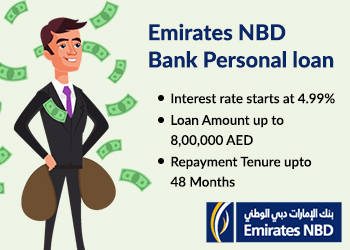
Getting a personal loan in Dubai can be very confusing and intimidating, especially if you are unfamiliar with the process. However, understanding the criteria for eligibility and the required documents that must be submitted will ensure an easier, smoother application process.
In order to apply for a personal loan in Dubai, applicants must first meet the criterion of being at least 21 years of age. This is due to the fact that UAE’s laws dictate that entering into any kind of financial contract requires a person to be at least 21 years old. Furthermore, applicants should also demonstrate a stable source of income as lenders will want proof of your ability to repay such a loan.
Personal Loan Eligibility in UAE
The first step to securing any kind of loan is understanding the eligibility requirements. Most lenders will look at your income, credit score, debt-to-income ratio, and other factors when determining if you’re eligible for a loan. Your credit history is particularly important; if you don’t have any prior credit history, some lenders may not be willing to work with you. Additionally, most lenders require applicants to have a valid UAE residency visa and bank account before they can approve a loan application.
Comparison Shopping
Once you know what the eligibility requirements are for different loans, it’s time to start comparison shopping. Different banks and lenders offer different interest rates and repayment terms on their loans. It pays to take the time to compare different options so that you get the best possible deal tailored to your needs. Consider things like interest rates, fees, minimum repayments, repayment period (some have longer periods than others), and other features as part of your comparison process.
Credit Card Option
In addition to taking out an unsecured personal loan from a bank or lender in Dubai, getting a credit card might be another option worth exploring. Most major banks in Dubai offer attractive credit cards with attractive rewards programs that could make them more appealing than taking out a standard personal loan from another source. Consider all the pros and cons of taking out a credit card before making your decision as it could affect your long-term financial health just as much as taking out an unsecured personal loan would.
Credit Score Impact
Finally, remember that taking on any additional debt can potentially impact your credit score negatively or positively depending on how well you manage that debt over time. If you already have high levels of existing debt, then additional debt may cause serious damage by further driving down your score; however if managed responsibly it may provide opportunities for increasing it through timely payments and responsible budgeting practices over time. This is something important to consider as it will likely impact future borrowing opportunities regardless of whether you're looking for an auto loan or mortgage down the line - so use extra caution when managing any new debts carefully!
The following documents must also be presented when applying for a personal loan in Dubai: original passport along with copies of valid ID; any relevant residence visas; original and copy of your Emirates ID; proof of address (such as utility bills or bank statements); salary certificate from employer or salary slip; evidence of adequate funds if self-employed. Additionally, it may be beneficial to provide additional documents such as bank statements or proof of other assets so that lenders can have more assurance regarding your creditworthiness. This information helps them determine if you are a responsible borrower and if they would like to extend loan options to you.
Apart from these documents, lenders may require certain forms to be filled out upon application which include: Loan Application Form – this form needs to include all personal details such as name, contact information and employment history; Financial Statement - A declaration about the applicant’s total monthly income & expenses; Salary Certificate - this is basically an official document issued by employers stating how much their employee is earning on a monthly basis & further confirming their current employment status; Guarantor Agreement – this document states that someone else is taking responsibility for your repayment in case you fail to do so yourself. It is important to note that guarantors chosen must themselves meet specific criteria before being accepted by lenders.
It is important for potential borrowers to research various lenders before applying for any type of loan as different banks tend to offer different interest rates and terms & conditions related to personal loans in Dubai. It could prove beneficial consulting those who have already taken out similar loans in order gain insight into what fees and charges are usually applicable when it comes getting approved for one’s desired loan amount. Lastly, it is essential that all paperwork needed when applying for a personal loan in Dubai is correctly completed as even minor mistakes may lead to rejection from the lender's side.
Using a Personal Loan Calculator
In Dubai, most personal loan calculators are accessible online and free for anyone to use. After answering basic questions about your financial situation and goals, these calculators will automatically generate a range of options from various banks or other financial institutions that could suit your needs. You then have the option to compare each one side-by-side in order to decide which is most suitable.
When using any personal loan calculator in Dubai, it's important that you provide accurate information regarding your income, existing debt obligations and credit score. This will ensure that the calculator returns results which are tailored to your exact circumstances and maximize savings over the long run. It may also be worthwhile getting prequalified for loans before using a calculator in order to get an idea of what rates you might qualify for ahead of time.
Besides helping borrowers get an idea of what type of loan is best suited for their needs and overall budgeting strategy, personal loan calculators can also be used as part of a larger financial planning process by helping borrowers project their future cash flow requirements in relation to upcoming major purchases or investments over time. By understanding their current debt burden relative to their income and assets, borrowers can more accurately plan for future responsibilities or opportunities that may arise down the road.

Personal loans provide a number of benefits to individuals who use them. One of the most attractive advantages of personal loans is that they are usually unsecured, meaning you don't have to put any collateral up in order for them to be approved. This makes them an attractive option for those who do not want to risk their property when borrowing money.
Another benefit is the potential for lower interest rates than other types of financing, such as credit cards or payday loans. Personal loan interest rates are often fixed and can be much more favorable than those associated with other forms of debt. Additionally, you may qualify for discounts if you set up automatic payments or have a good credit score. This means that you could save quite a bit of money on your loan over time by taking advantage of these discounts.
Furthermore, personal loans are generally disbursed quickly once approved; this means that you can have access to the funds almost immediately so as to address any immediate needs without having to wait for weeks or months like some other types of financing require.








































































































































































































